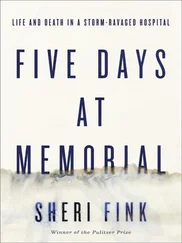Дуглас Кеннеди - Five Days
Здесь есть возможность читать онлайн «Дуглас Кеннеди - Five Days» весь текст электронной книги совершенно бесплатно (целиком полную версию без сокращений). В некоторых случаях можно слушать аудио, скачать через торрент в формате fb2 и присутствует краткое содержание. Год выпуска: 2015, Жанр: Современная проза, на английском языке. Описание произведения, (предисловие) а так же отзывы посетителей доступны на портале библиотеки ЛибКат.
- Название:Five Days
- Автор:
- Жанр:
- Год:2015
- ISBN:нет данных
- Рейтинг книги:4 / 5. Голосов: 1
-
Избранное:Добавить в избранное
- Отзывы:
-
Ваша оценка:
- 80
- 1
- 2
- 3
- 4
- 5
Five Days: краткое содержание, описание и аннотация
Предлагаем к чтению аннотацию, описание, краткое содержание или предисловие (зависит от того, что написал сам автор книги «Five Days»). Если вы не нашли необходимую информацию о книге — напишите в комментариях, мы постараемся отыскать её.
Five Days — читать онлайн бесплатно полную книгу (весь текст) целиком
Ниже представлен текст книги, разбитый по страницам. Система сохранения места последней прочитанной страницы, позволяет с удобством читать онлайн бесплатно книгу «Five Days», без необходимости каждый раз заново искать на чём Вы остановились. Поставьте закладку, и сможете в любой момент перейти на страницу, на которой закончили чтение.
Интервал:
Закладка:
‘If there’s one thing I know about my work it’s that it constantly reminds me of the enigmas we all live with. The discovery that what seems to be evident is frequently cloudy; that we are all so profoundly vulnerable, yet also so profoundly resilient; that, out of nowhere, our story can change. I’m always dealing with people in extremis, in real possible danger, and grappling so often with fear. Everyone I have ever scanned or X-rayed has a story — their story. But though my equipment peers behind the outer layer we all have, if all these years at the hospital have taught me anything it is that everyone is a mystery. Most especially to themselves.’
Three days later I awoke at five and headed south to Portland, reporting as agreed at an early hour to go through the usual employee registration process: being photographed and fingerprinted, being issued an ID and parking sticker, doing all the paperwork to transfer me to the hospital’s health scheme, being given a complete checkup by a staff doctor, then spending much of the day being taken around by a soon-to-be-retiring technologist named Ruth Redding — who, in her own quiet way, made it clear that this was the closest Maine came to a high-pressured urban hospital. Radiography operated day and night, ‘and though we might not be Mass General, the pressure is always on. But, trust me, it’s never less than interesting — and from what I saw in your file, you can handle the pressure.’
Pressurized it was, especially as we were very much an adjunct of the ER and seemed to be dealing with at least a dozen bad accidents per day. Then there was the booked-full stream of scheduled procedures — and the need to maintain time-management efficiency (in Damariscotta we might have an entire forty-five minutes twice a day when no patient was scheduled, and accident cases usually were rushed to the bigger hospital in Brunswick). The head of radiology, Dr Conrad, was hyper-rigorous and exacting. But I had worked with this sort of boss in the past — and decided to show her, early on, that I would match her professionalism and clinical cool. Though she was notoriously closed-lipped when it came to praising others (as the other technologists in the department told me), she did turn to me after a few weeks on the job and say: ‘Hiring you was a good call.’
End of praise. But it still touched me.
‘So it’s all right accepting praise from others?’ Lisa Schneider asked during a session a few days later.
‘I’ll tell you something rather interesting — the crying fits that used to characterize so much of the last year have largely stopped. Yes, I can still get deeply affected by a patient. There was a sixteen-year-old girl in last week with what was clearly a major malignancy in her uterus — and that was a tough hour. But I didn’t break down afterwards, as I had done so often last year.’
‘And why do you think that is?’
I shrugged, then said:
‘I don’t know. maybe the fact that I am no longer in an unhappy marriage. I can’t say I am in a happy place myself. but then again, as you keep telling me, this is a period of serious transition, so don’t expect “inner peace” or zen-like calm.’
Lisa Schneider looked at me quizzically.
‘Now I think you’re putting words in my mouth.’
‘Actually, those were Sally’s words — when I settled her into her dorm room at U Maine last weekend. “You’re looking a little happier, Mom. Don’t tell me you’ve gone all inner peace and zen on me.”’
‘How did all that go with Sally?’
‘It was a wrench, seeing my youngest child now starting college, for all the obvious reasons. Then again, having moved out of the house a few weeks before, there wasn’t that terrible silence of coming home afterwards to the proverbial empty nest. Dan suffered that, however. We agreed by email that I would settle Sally in on Friday and Saturday, then leave Sunday morning — and he’d come up and see her then. Around ten o’clock that night, long after Dan usually goes to bed, I got a call on my cellphone. It was my soon-to-be ex-husband. Sounding beyond sad. Saying that coming home to this empty house was beyond awful. Telling me how stupid he had been. How if he could turn back the clock. ’
‘And how did you reply to all this?’
‘I was polite. I never once mentioned how he had talked about my affair with our children, and how monstrous I thought that all was. But when he asked if he could come over now and see me — that he really wanted to try and work things out — I was very definitive. I simply said no. That’s when he started to cry.’
‘How did you feel about that?’
‘Sad, of course. But — and this was an interesting change — not guilty at all.’
‘That is an interesting change,’ she said.
‘It’s all interesting change, isn’t it?’
‘You tell me.’
‘Something else happened a few days ago. During coffee break at the hospital I picked up the Portland Press Herald that is always left for us in the staff room every morning. Turned a page, saw a small item in the “In State” columns — the suicide of a prisoner at the State Psychiatric Prison Hospital in Bangor. William Copeland, age twenty-six. Richard’s son.’
‘What terrible news,’ she said with studied neutrality.
‘I was very shaken by it.’
‘Because?’
‘Because. Billy would have been my stepson, had everything worked out as we — I — had hoped. Because I felt so sorry for Richard. Because I still feel so insanely confused about my feelings for him. Part of me still loves him. Part of me is finally somewhat angry about it all — which I know you will tell me is “good”, because you think my inability to express anger has caused me to throw up these blockages that have stymied my life, right?’
‘You tell me.’
Oh God, how she wielded that line all the time like a scalpel.
‘I am still so incredibly hurt by what happened, and how his panic cost us both so much. Part of me thinks, What a coward. Part of me also thinks, What a sad man. Part of me also thinks, Thanks to Richard I was able to get out of my marriage. Right now, I so feel for him. He loved Billy. His son’s life was such a tragic one.’
I fell quiet for a few moments. Then:
‘A day or so after reading the piece about Billy’s suicide I sent Richard an email. Short. To the point. Telling him how what he was now going through was the worst thing that could befall a parent, and how I was thinking about him as he negotiated this very terrible period.’
‘Did he reply?’
I shook my head.
‘Did that bother you?’
‘We can’t script anything, can we? I mean, it’s not a novel, where the writer can make happen anything actually happen. But, yes, there was a big part of me that wanted Richard to call me up, tell me he had never stopped loving me, that the loss of his son had finally freed him from any sense of ongoing emotional guilt when it came to the wife he’d never really loved, and — then — he shows up on my doorstep and, voilа, the happy ending that never really arrives in life.’
‘But say that did happen? Would you open the door to him now?’
‘Yes, I would. That doesn’t mean I wouldn’t be a little wary as well. But what we discovered in each other that weekend, what we shared. I am not going to diminish it by saying I spent those three days living a middle-aged romantic hallucination that had no bearing on actual reality. Better than anyone — because I have taken it apart so much with you — you know that, for me, this was so completely real. As I know it was for Richard as well. So I can say something really obvious like, “Life is sometimes so unfair.” But the truth is, we are usually so unfair to ourselves.’
‘And knowing that now.?’
Читать дальшеИнтервал:
Закладка:
Похожие книги на «Five Days»
Представляем Вашему вниманию похожие книги на «Five Days» списком для выбора. Мы отобрали схожую по названию и смыслу литературу в надежде предоставить читателям больше вариантов отыскать новые, интересные, ещё непрочитанные произведения.
Обсуждение, отзывы о книге «Five Days» и просто собственные мнения читателей. Оставьте ваши комментарии, напишите, что Вы думаете о произведении, его смысле или главных героях. Укажите что конкретно понравилось, а что нет, и почему Вы так считаете.












